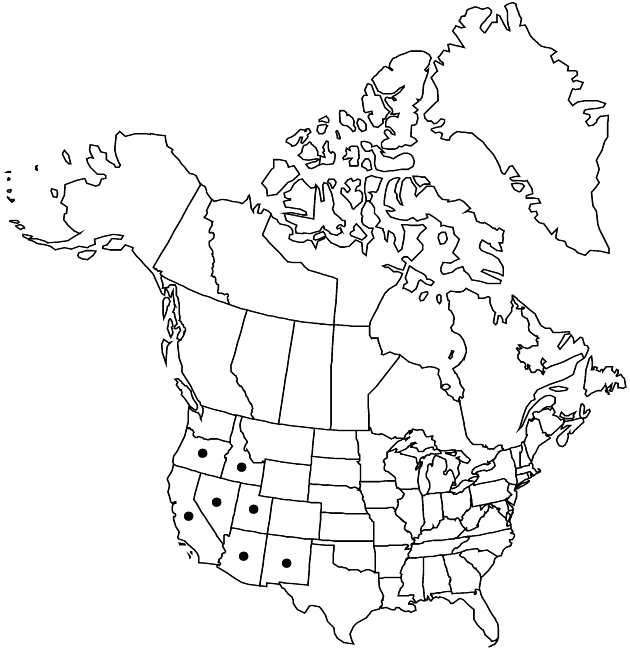Difference between revisions of "Malacothrix glabrata"
in A. Gray et al., Syn. Fl. N. Amer. 1(2): 422. 1884.
FNA>Volume Importer |
imported>Volume Importer |
||
| (3 intermediate revisions by 2 users not shown) | |||
| Line 1: | Line 1: | ||
{{Treatment/ID | {{Treatment/ID | ||
|accepted_name=Malacothrix glabrata | |accepted_name=Malacothrix glabrata | ||
| − | |accepted_authority=(A. Gray ex D. C. Eaton) A. Gray | + | |accepted_authority=(A. Gray ex D. C. Eaton) A. Gray |
|publications={{Treatment/Publication | |publications={{Treatment/Publication | ||
|title=in A. Gray et al., Syn. Fl. N. Amer. | |title=in A. Gray et al., Syn. Fl. N. Amer. | ||
| Line 11: | Line 11: | ||
|name=Malacothrix californica var. glabrata | |name=Malacothrix californica var. glabrata | ||
|authority=A. Gray ex D. C. Eaton | |authority=A. Gray ex D. C. Eaton | ||
| + | |rank=variety | ||
|publication_title=in S. Watson, Botany (Fortieth Parallel), | |publication_title=in S. Watson, Botany (Fortieth Parallel), | ||
|publication_place=201. 1871 | |publication_place=201. 1871 | ||
| Line 38: | Line 39: | ||
-->{{#Taxon: | -->{{#Taxon: | ||
name=Malacothrix glabrata | name=Malacothrix glabrata | ||
| − | + | |authority=(A. Gray ex D. C. Eaton) A. Gray | |
| − | |authority=(A. Gray ex D. C. Eaton) A. Gray | ||
|rank=species | |rank=species | ||
|parent rank=genus | |parent rank=genus | ||
| Line 53: | Line 53: | ||
|publication year=1884 | |publication year=1884 | ||
|special status= | |special status= | ||
| − | |source xml=https:// | + | |source xml=https://bitbucket.org/aafc-mbb/fna-data-curation/src/2e0870ddd59836b60bcf96646a41e87ea5a5943a/coarse_grained_fna_xml/V19-20-21/V19_474.xml |
|tribe=Asteraceae tribe Cichorieae | |tribe=Asteraceae tribe Cichorieae | ||
|genus=Malacothrix | |genus=Malacothrix | ||
Latest revision as of 19:52, 5 November 2020
Annuals, (5–)10–40+ cm. Stems (1–)3–5+, ascending to erect, usually branched proximally and distally, glabrous or sparsely arachno-puberulent near bases (sometimes glaucous). Cauline leaves: proximal usually pinnately lobed (lobes 3–6+ pairs, usually filiform, subequal to unequal, apices acute), ultimate margins entire, faces glabrous or ± hairy (then usually glabrescent); distal reduced (usually pinnately lobed). Calyculi of 12–20+, lanceolate to linear bractlets, hyaline margins 0.05–0.2 mm wide (abaxial faces often ± densely white-hairy). Involucres campanulate to hemispheric, 9–17 × 4–7 mm. Phyllaries 20–25+ in 2–3 series, lance-linear to linear, hyaline margins 0.05–0.3 mm wide, faces usually glabrous, abaxial sometimes ± white-hairy. Receptacles bristly. Florets 31–139; corollas usually pale yellow, sometimes white, 15–23+ mm; outer ligules exserted 9–15+ mm. Cypselae ± cylindro-fusiform (sometimes weakly 5-angled), 2–3.3 mm, ribs extending to apices, usually ± equal; persistent pappi of 0–12+, blunt to acute teeth plus 1–2(–5) bristles. Pollen 70–100% 3-porate. 2n = 14.
Phenology: Flowering Mar–Jul.
Habitat: Coarse soils in open areas, or among shrubs, creosote bush scrublands, Amsinckia, Artemisia, and Atriplex-Larrea associations, Joshua tree woodlands
Elevation: 0–1800 m
Distribution

Ariz., Calif., Idaho, Nev., N.Mex., Oreg., Utah, Mexico (Baja California, Sonora).
Discussion
Malacothrix glabrata grows in the Mojave, Great Basin, and Sonoran deserts in California and the Intermountain region in Arizona, Nevada, Oregon, and Utah.
Selected References
None.